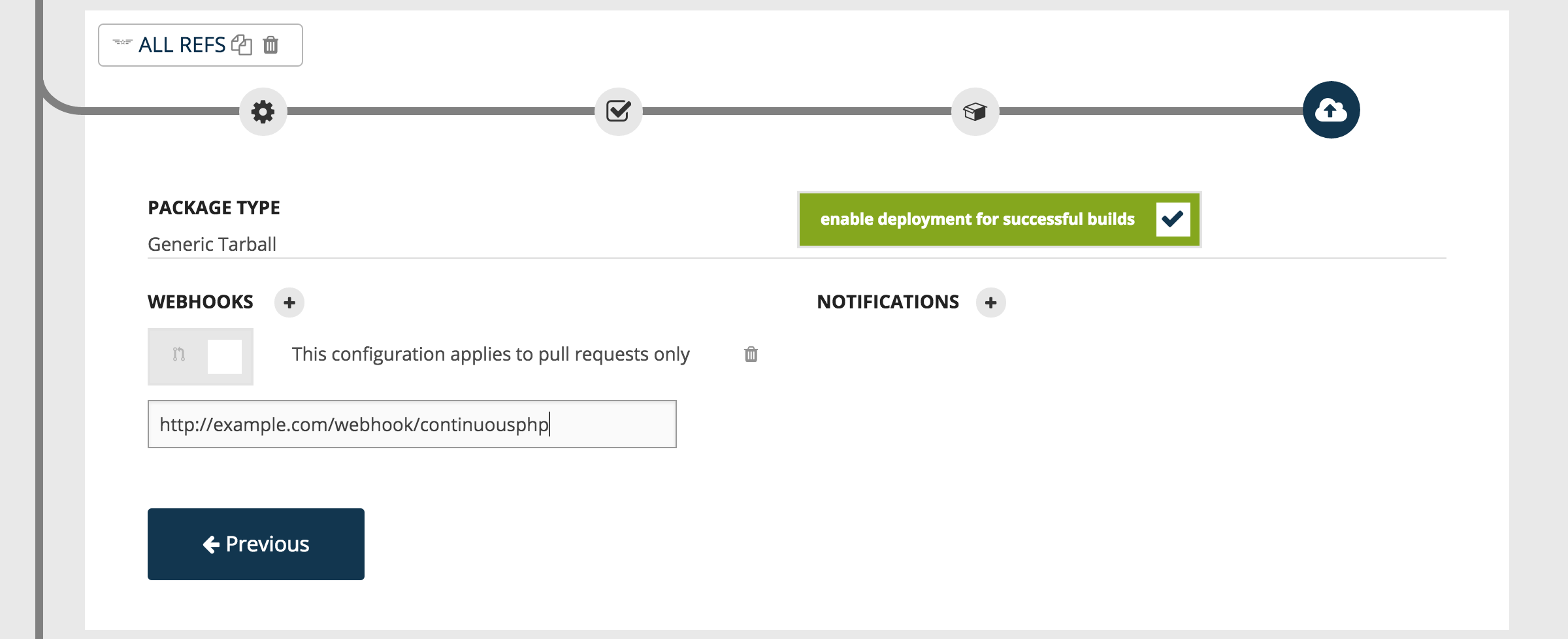Automated deployment agent to install on your servers.
It manages automated deployment workflows based on webhooks for your projects.
- PHP 5.5+
- PHP mcrypt extension
- sqlite or other doctrine compatible SGBD (sqlite is currently the only one officially supported)
You can use our Docker image as a container service. The container is isolated from the rest of your Server and you have not to worry about server dependencies or security.
Thanks to report to Docker-Hub documentation.
- Download Composer:
curl -sS https://getcomposer.org/composer.phar -o composer.phar - Install the Deploy Agent:
php composer.phar create-project continuousphp/deploy-agent - Start using the agent:
cd deploy-agent && ./agent
To setup apache, setup a virtual host that points to the public/ directory of the project and you should be ready to go! It should be something similar to:
<VirtualHost *>
DocumentRoot /path/to/deploy-agent/public
<Directory /path/to/deploy-agent/public>
DirectoryIndex index.php
AllowOverride All
Order allow,deny
Allow from all
</Directory>
</VirtualHost>
Also enable apache mod rewrite in order to support webhook routes
a2enmod rewrite
./agent list applications
./agent add application [--provider=] [--token=] [--repository-provider=] [--repository=] [--pipeline=] [--name=] [--path=]
- --provider The application provider to use (currently, continuousphp is the only supported application provider)
- --token A valid token to consume the provider API (ie: continuousphp API token)
- --repository-provider The repository provider to use (ie: git-hub, bitbucket...)
(for continuousphp only) - --repository The repository key to use (ie: continuousphp/deploy-agent)
- --pipeline The pipeline to use (ie: refs/heads/master)
(for continuousphp only) - --name The name of the application
- --path The destination path of the application
The token depends on the Provider. At this time, the continousphp API is the only one supported.
You can retrieve your personal token on your Profile page at continuousphp.com/profile
./agent deploy application [--name=] [--build=]
- --name The name of the application
- --build The ID of the build to deploy
When a deployment occurs, the Deploy Agent creates a new folder for every build in its dedicated workspace. To enable the new build, it will create/update a symlink to the current build
[application-path]
|
+---[/current] (symlink to current build)
|
+---[/build-1]
|
+---[/build-2]
During the deployment workflow the Deploy Agent can execute project specific commands through hooks to define in a continuous.yml file as following:
# continuous.yml
deployment:
hooks:
AfterInstall:
- command: echo 'the application is successfully installed'
BeforeActivate:
- command: echo 'the application is going to start'
AfterActivate:
- command: echo 'the application has started'The URL of the hook to implement in continuousphp is <baseuri>/webhook/continuousphp.
Configure it as following:

- AfterInstall : triggered just after the application package has been extracted
- BeforeActivate : triggered just before the symlink update
- AfterActivate : triggered just after the symlink update
Please note that this project is released with a Contributor Code of Conduct. By participating in this project you agree to abide by its terms.
Feel free to fork the project, create a feature branch, and send us a pull request!